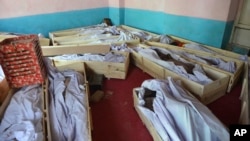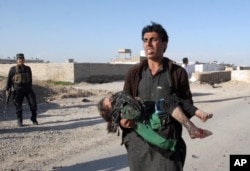Afghanistan's civilians continue to die in record numbers, according to a new report released Wednesday by the United Nations Assistance Mission in Afghanistan.
From the start of the year to the end of September, the U.N. documented 8,050 civilian casualties, of which 2,798 died, and 5,252 were wounded.
In the 17 years of conflict, the last five years seem to have been the deadliest for civilians, a chart in UNAMA's report indicates.
Most of the casualties resulted from the actions by non-state actors, including the Taliban and Islamic State. The use of improvised explosive devices used in suicide attacks increased in their "frequency and lethality," according to the U.N.'s Quarterly Report on the Protection of Civilians in Armed Conflict.
"Of the 65 percent of civilian casualties attributed to anti-government elements, 35 percent were attributed to the Taliban; 25 percent to Daesh/ISKP; and 5 percent to unidentified anti-government elements (including less than 1 percent to self-proclaimed Daesh/ISKP)," the U.N. report specified.
Ground engagements
The second leading cause for civilian casualties, 29 percent, was ground engagements between warring factions.
The report said casualties from ground engagements have declined, which may be due to efforts by various parties to protect civilians from harm, like advance warnings.
The province with the most casualties was Nangarhar, where ISKP, Islamic State's Afghan branch, still has a stronghold. It was also the deadliest province for U.S. forces in 2017.
The increase in NATO and U.S. airstrikes on Taliban and ISKP targets, particularly since President Donald Trump announced a new South Asia policy in August of last year, led to an increase in civilian casualties from air operations, the report said. The U.N. called the trend "worrying."
More than 60 percent of the civilian victims of air attacks continued to be women and children, with the number of child victims increasing 53 percent over the same period last year, according to the report.
Many attacks were on anti-government elements hiding among the civilian population, the report said.
UNAMA has recommended to both Afghan and international forces that they review their targeting and battlefield criteria, including "considering all persons to be civilians unless determined otherwise."
Reports of human rights abuses during government search operations is another concern of the U.N. mission.
"The mission received consistent, credible accounts of intentional destruction of civilian property, illegal detention, and other abuses carried out by NDS Special Forces and pro-government armed groups, including the Khost Protection Force," the UNAMA report said.
The report also documented the "killing, maiming, sexual abuse and recruitment and use of Afghan girls and boys."
Election-related violence
Meanwhile, 366 civilian casualties were a result of election-related violence. Afghanistan plans to hold its parliamentary election on Oct. 20.
Calling the upcoming election "bogus," the Taliban announced this week that it would use all means to disrupt the elections, giving rise to fears that election-related violence will increase in the next two weeks.
"The Islamic Emirate instructs all its Mujahideen to halt this American-led process throughout the country by creating severe obstacles for it, while taking extensive and intensive care of civilian Afghan lives and their properties," the Taliban statement said, asking fighters to attack anyone involved in helping hold the elections.
The U.N. report also pointed out that civilians paid the heaviest toll during several days of fighting in Ghazni city when the Taliban launched a multipronged attack in August.
"All parties can and should do their utmost to protect civilians from harm," said Tadamichi Yamamoto, the secretary-general's special representative for Afghanistan and head of UNAMA.





